
Journal of Science Education and Technology
Scope & Guideline
Shaping Tomorrow’s STEM Leaders Today.
Introduction
Aims and Scopes
- Integration of Technology in Science Education:
The journal emphasizes research on how technology can be effectively integrated into science education to enhance teaching practices and student learning outcomes. - Innovative Pedagogical Approaches:
There is a strong focus on innovative teaching methodologies such as inquiry-based learning, project-based learning, and the use of digital tools to facilitate active learning in science. - Assessment and Evaluation in Science Education:
The journal also covers studies on various assessment strategies, including formative and summative assessments, to evaluate student learning and engagement in science. - STEM Education and Interdisciplinary Learning:
Research related to STEM (Science, Technology, Engineering, Mathematics) education is a core area, highlighting interdisciplinary approaches and the integration of engineering and technology in science curricula. - Teacher Professional Development:
The journal addresses the continuous professional development of educators, focusing on their preparedness to teach contemporary science topics through innovative methods and tools.
Trending and Emerging
- Artificial Intelligence and Machine Learning in Education:
There is a growing interest in the application of AI and machine learning tools in science education, exploring their potential to enhance personalized learning and assessment. - Augmented and Virtual Reality in Science Learning:
Research on the use of augmented reality (AR) and virtual reality (VR) technologies is trending, as educators seek innovative ways to engage students and provide immersive learning experiences. - Collaborative and Cooperative Learning Strategies:
Emerging studies highlight the importance of collaborative learning environments, where students work together to solve problems and engage in inquiry-based activities. - Emphasis on Socio-scientific Issues:
There is an increasing focus on socio-scientific issues in science education, encouraging students to engage with real-world problems and develop critical thinking skills. - Digital Literacy and Computational Thinking:
The integration of digital literacy and computational thinking into science curricula is becoming a key area of interest, reflecting the need for students to navigate the digital landscape effectively.
Declining or Waning
- Traditional Lecture-Based Teaching Methods:
There has been a noticeable decrease in research focused on traditional lecture-based teaching methods, as the field shifts towards more interactive and student-centered approaches. - Simple Technology Integration:
Research that merely addresses the use of technology without an emphasis on pedagogical strategies or student engagement is becoming less common, as the journal seeks more comprehensive studies that examine the impact of technology on learning. - General Science Education without Technology Focus:
There is a waning interest in broad discussions of science education that do not incorporate technological advancements, reflecting a trend towards more specific and technology-rich educational practices. - Studies on Basic Science Concepts without Contextual Application:
Research papers that focus solely on basic science concepts without applying them in real-world or contextual settings are appearing less frequently, as the journal favors studies that demonstrate practical applications. - Traditional Assessment Methods:
There has been a decline in studies that focus on traditional assessment methods, with a growing emphasis on innovative and technology-enhanced assessment practices.
Similar Journals

Medical Science Educator
Elevating teaching practices with cutting-edge insights.Medical Science Educator, published by SpringerNature, is an esteemed journal committed to advancing the intersection of educational methodologies and medical science. With a significant impact in its field, this journal holds a Q2 ranking in both Education and Medicine (miscellaneous) categories as of 2023, reflecting its dedication to high-quality research and scholarly dialogue. Operating in a digital format, the journal uniquely facilitates access to pivotal studies from its inception in 2011 until 2024, fostering innovation in medical education. The latest rankings highlight its credibility, placing it at the 63rd percentile in Social Sciences - Education and the 56th percentile in Medicine - Medicine (miscellaneous) within Scopus. This platform serves as an invaluable resource for educators, researchers, and practitioners aiming to enhance teaching practices and shape the future of medical education.
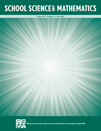
School Science and Mathematics
Transforming the future of science and mathematics education, one article at a time.School Science and Mathematics is a prestigious academic journal published by WILEY, focusing on the intersection of education, mathematics, and the sciences. With an ISSN of 0036-6803 and an E-ISSN of 1949-8594, this journal has been a vital resource for educators, researchers, and practitioners since its inception. Indexed in top-tier databases, it boasts impressive Scopus rankings with a Q1 classification in History and Philosophy of Science and a consistent Q2 positions in Education and Engineering, showcasing its impact within the academic community. The journal aims to enhance the teaching and learning of science and mathematics by publishing high-quality, peer-reviewed research that informs best practices and innovative approaches in education. Operating from the United States, it attracts contributions that influence educational strategies and curriculum development across varied disciplines, making it an essential venue for those engaged in advancing knowledge within these fields. Access to its insightful articles can enrich your understanding and drive dialogue among scholars dedicated to improving science and mathematics education.
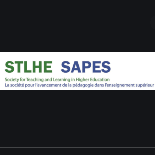
Canadian Journal for the Scholarship of Teaching and Learning
Exploring Evidence-Based Strategies for Effective LearningThe Canadian Journal for the Scholarship of Teaching and Learning (CJSoTL) is a premier open-access journal dedicated to advancing research and discourse in the field of teaching and learning within higher education. Published by SOC TEACHING & LEARNING HIGHER EDUCATION, CJSoTL serves as a vital resource for educators, researchers, and students alike, promoting evidence-based practices and scholarship in higher education pedagogy. Since its inception in 2010, the journal has provided an inclusive platform for innovative research, case studies, and pedagogical strategies that enhance teaching effectiveness and student learning outcomes. Although specific metrics such as H-index and Scopus ranks are currently unlisted, the journal is committed to fostering a community of practice among scholars dedicated to improving teaching and learning environments. With its open-access policy, CJSoTL ensures that valuable knowledge is freely available, aligning with contemporary trends in academic dissemination and accessibility, thus making significant contributions to the scholarship of teaching and learning in Canada and beyond.
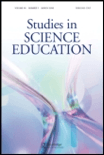
Studies in Science Education
Fostering Insightful Discussions in Science LearningStudies in Science Education is a prestigious journal published by ROUTLEDGE JOURNALS, TAYLOR & FRANCIS LTD, renowned for its commitment to advancing the field of science education. With an impressive impact factor, and categorized in the Q1 quartile within the Education domain, this journal ranks among the top in the field, currently holding the 16th position out of 1543 social science education journals, placing it in the 98th percentile according to Scopus rankings. Since its inception in 1974, it has provided a rigorous platform for researchers, practitioners, and educators to explore, debate, and disseminate significant findings relevant to science education. Although the journal does not offer open access options, it ensures high visibility through its well-curated content, including empirical studies, theoretical discussions, and innovative practices aimed at enhancing educational outcomes in science. By continuously engaging with contemporary educational challenges, Studies in Science Education serves as an essential resource for those dedicated to improving science teaching and learning worldwide.

International Journal of Science and Mathematics Education
Advancing Knowledge in Science and Mathematics EducationWelcome to the International Journal of Science and Mathematics Education, an esteemed publication that has served as a vital platform for cutting-edge research in the fields of science and mathematics education since its inception in 2003. Published by SPRINGER in the Netherlands, this journal has consistently established itself in the top tier of academic publishing, as evidenced by its ranking in the Q1 category for both Education and Mathematics (miscellaneous) in 2023. With an impressive Scopus ranking placing it at #26 in General Mathematics and #269 in Social Sciences Education, the journal is a must-read for researchers, educators, and policymakers dedicated to enhancing the teaching and learning of mathematics and science. Although not open access, the journal is committed to disseminating high-quality research that bridges theory and practice, fostering innovative approaches and collaboration within the academic community. By supporting empirical studies, methodological advancements, and theoretical discussions, the International Journal of Science and Mathematics Education plays a crucial role in shaping educational practices and policies worldwide.
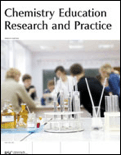
Chemistry Education Research and Practice
Elevating Chemistry Instruction with Rigorous ResearchChemistry Education Research and Practice is a prominent journal dedicated to advancing the field of chemistry education through rigorous research and innovative practices. Published by the Royal Society of Chemistry, this journal, with an ISSN of 1109-4028 and an E-ISSN of 1756-1108, operates out of Greece and has established itself as a leading voice in the intersection of chemistry and educational methodology. With a remarkable impact factor and ranking in the top quartiles (Q1) for both Chemistry and Education in 2023, it appeals to a diverse audience of researchers, educators, and practitioners who are passionate about enhancing chemistry instruction and learning experiences. The journal spans a wide range of topics, aiming to promote and disseminate high-quality research that informs pedagogical strategies, curriculum development, and educational policy. By providing a platform for vibrant discussions and new ideas, Chemistry Education Research and Practice plays a crucial role in shaping the future of chemistry education worldwide and continues to impact the academic community significantly.

MIER-Journal of Educational Studies Trends and Practices
Unlocking the potential of education through shared knowledge.MIER-Journal of Educational Studies Trends and Practices is a pivotal academic journal dedicated to advancing the field of education, focusing on innovative research and trends that influence teaching and learning practices. Published by the esteemed MODEL INST EDUCATION & RESEARCH, this journal offers a platform for researchers, educators, and students to disseminate knowledge and insights on various educational methodologies, curricular developments, and pedagogical theories. While the journal's current impact factor is not specified, its commitment to fostering scholarly discourse positions it as a notable contributor to the field. With an ISSN of 0976-8203 and an E-ISSN of 2319-1945, MIER aims to promote open access to current educational research, making it accessible to a global audience. By engaging with contemporary educational issues and emerging practices, this journal serves as a valuable resource for those dedicated to enhancing educational outcomes and developing effective teaching strategies.
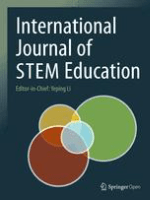
International Journal of STEM Education
Fostering Excellence in Science, Technology, Engineering, and Mathematics EducationThe International Journal of STEM Education, published by Springer, is a leading open-access journal dedicated to advancing the field of STEM (Science, Technology, Engineering, and Mathematics) education. With its ISSN 2196-7822 and e-ISSN 2196-7822, the journal has established a significant presence in its domain since its launch in 2014, operating with an increased depth of scholarship through 2024. Hailing from Switzerland and addressing a global audience, the journal has achieved a remarkable ranking of Q1 in Education for 2023, placing it in the top tier of its field. The journal is ranked 26th out of 1543 in Social Sciences - Education according to Scopus metrics, highlighting its influence in shaping contemporary educational practices. By offering a platform for high-quality research articles, reviews, and case studies, the International Journal of STEM Education aims to promote effective teaching methodologies and innovation in STEM pedagogy, catering to researchers, educators, and policy makers alike. The commitment to open access ensures that the knowledge generated is readily available, fostering collaboration and dissemination of cutting-edge developments in STEM education.

International Journal of Instruction
Bridging theory and practice in the global educational landscape.International Journal of Instruction is a distinguished peer-reviewed journal dedicated to advancing the field of education through high-quality research and innovative instructional practices. Published by GATE Association for Teaching & Education in Switzerland, this open-access journal has been a beacon of knowledge since its inception in 2008, ensuring that impactful educational research is freely accessible to scholars, educators, and practitioners worldwide. With an impressive Q2 ranking in Education and a notable position in the 80th percentile within its category in Scopus, the journal showcases cutting-edge studies and discussions that reflect current trends and methodologies in teaching and learning. The scope of the journal includes a wide array of topics, ranging from instructional strategies to curriculum development, making it a vital resource for anyone engaged in the dynamic landscape of education. Explore the International Journal of Instruction today to contribute to and benefit from the collective wisdom of the global educational community.
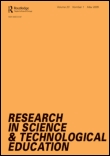
Research in Science & Technological Education
Empowering Educators with Cutting-Edge InsightsResearch in Science & Technological Education, published by Routledge Journals, Taylor & Francis Ltd, is a leading international journal dedicated to advancing the field of education within the realms of science and technology. With its ISSN 0263-5143 and E-ISSN 1470-1138, this prestigious journal provides a platform for innovative and rigorous research from 1983 to the present, thus offering critical insights into pedagogical practices, curriculum development, and policy-making. Boasting a remarkable impact, it ranks in the top quartile (Q1) in both Education and Multidisciplinary categories as of 2023, with an impressive Scopus ranking of #270 out of 1543 in Social Sciences _ Education, placing it in the 82nd percentile. Researchers, educators, and students will find invaluable resources and discussions that shape the future of science and technological education in an increasingly complex world. Although this journal does not offer Open Access, it maintains a strong commitment to disseminating high-quality research, making it an essential read for those invested in the evolution of educational practices and outcomes in the STEM fields.